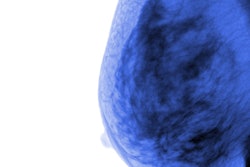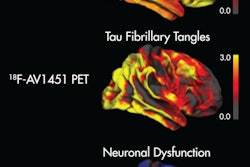Molecular breast imaging developer Dilon Diagnostics is highlighting new molecular breast tomosynthesis technology at the Society of Nuclear Medicine and Molecular Imaging (SNMMI) meeting in San Diego.
Researchers at the University of Florida and the Department of Energy's Thomas Jefferson National Accelerator Facility in Virginia have designed a device that can replace the collimator in Dilon's molecular breast imaging system, Dilon 6800, and allow users to perform molecular breast tomosynthesis, according to the vendor.
The system is based on what the researchers call a variable-angle slant hole collimator made from lithographically produced tungsten plates. The plates can be controlled by a computer to view the breast from various angles without moving the camera, Dilon said.
In laboratory tests on breast phantoms, molecular breast tomosynthesis scans showed that lesion contrast could be increased by a factor of six, Dilon said. In addition, radiation dose could potentially be decreased by a factor of two over current levels while maintaining the same or better image quality, according to the vendor.




















